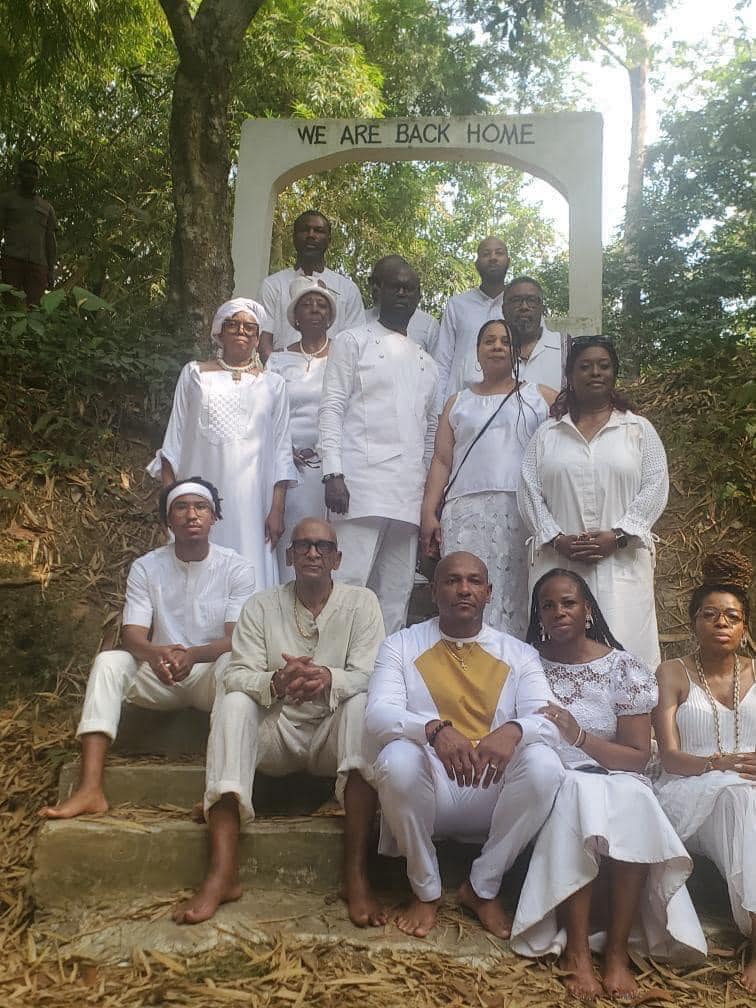
IL Representative Carol Ammons with a group of Illinois Legislative Black Caucus members and Champaign County Clerk Aaron Ammons after Rep. Ammons was crowned Queen Mother Aguadze of Kéta in the Volta Region of Ghana—a historic first for an African American. Photo courtesy Carol Ammons
“Visiting Ghana had a significant impact on me, both personally and professionally. It solidified my perspective on the importance of building bridges between African nations and the African diaspora. My visit home inspired me to integrate these newfound insights into my legislative work, such as [IL] House Resolution 453 Family Roots Genealogy Pilot Program. HR 453 seeks to reconnect people of African descent with African ancestry by using genetic genealogy to identify both reference and living African relatives. It also allows those who were separated from their ancestral homeland to find possible living relatives in their ethnic homeland.” (Carol Ammons)
For the descendants of Africans who were enslaved by colonial powers, family history might only be traceable back to the Middle Passage of the transatlantic slave trade. Even then it is often impossible to trace their family trees, since births and sales of the enslaved were poorly documented, marriages often unrecorded, and fathers unacknowledged. Thanks to the genomic revolution, private corporations offer the ability to restore these lost family trees or give an estimate of ethnicity. Using a sample of saliva, researchers can estimate ethnicity and find relatives not only in the US, but an ocean away, and (depending on the service) provide a platform to message consenting relatives. All this if an individual can pay the asking price of $99 or higher.
Illinois State Representative Carol Ammons (D-Urbana) went through this journey. She had her DNA tested by two companies, a common occurrence for genealogy consumers. Her quest for reconnection with her own family history saw her visit Ghana, where test results showed she had relatives. This experience caused Ammons to wish other African descendants could have the same experience without paying a private corporation. As it was the US government that profited from slavery, Ammons believes the government should pay for individuals to access this new tool to restore family histories.
Ammons connected with LaKisha David, assistant professor of anthropology at UIUC, to craft a program to reconnect African Americans with relations a continent away. Dr. David’s research centers on the use of genetic genealogy by African Americans to reconnect with genetic relatives worldwide, and the sociocultural impact of using these tools. Her work argues that this knowledge can have a deep impact on identity formation and can heal these profound intergenerational psychological wounds. According to David, “about 12.5 million people were trafficked from ancestral homelands as a result of the practice of slavery . . . family ties have been disrupted, and the reason why these are so significant is because this feeds into our understanding of who we are . . . and when we are not able to have that information, that does have a psychological negative impact.” David agrees with Ammons’ realization that this knowledge “isn’t something that people of African descent should have to pay for because [the loss] was the result of . . . human trafficking.”
In an 2007 article for the University of Chicago Magazine, Lydialyle Gibson captured similar remarks by Rick Kittles, biologist and cofounder of the company African Ancestry, who stated “one of the components that shapes identity is family history, and for African Americans there’s a void. You hit a wall in the antebellum South . . . but our history didn’t start with slavery; we came through slavery. To overcome that wall is more empowering than I can describe.” The goals of African Ancestry, reuniting African Americans with the present-day Africans who share their genetic ancestry, are similar to those of Ammons and David; but African Ancestry is a for-profit venture that currently charges $299 for their maternal (mitochondrial) and paternal (Y-chromosome) DNA test kits.
Working together, Ammons and David have crafted the Family Roots Genealogy Pilot Program that is up for a vote in the Illinois House of Representatives as HR 453. This pilot would see up to 900 Illinois residents of African descent born prior to 1965 send in saliva samples for analysis; samples would be processed at the university’s biotechnology center and analyzed by David in collaboration with the National Center for Supercomputing Applications (NCSA) at UIUC. David says of the proposal that “House Resolution 453 stands as a pioneering initiative, aiming to heal those deep-seated wounds and support healthy identity development by restoring disrupted African family connections.”
After the recent 23andMe data breach, security and confidentiality is an understandable concern. Participants will be informed of their genetic similarities both to groups whose data is publicly available and to others tested in this program. In addition to adhering to all applicable health privacy laws for handling saliva samples and related data, physical samples will be destroyed after analysis and not retained for future reuse. To alleviate any further privacy or security worries, participants can request to have their electronic data deleted and removed from the project at any time. More than just informing individuals of their ethnicity, the program hopes to connect genetic relatives through a messaging system open to participants.
The resolution was passed by the House Immigration & Human Rights Committee on February 7, but at the time of writing the measure is still on the Calendar Order of Resolutions, where it awaits voting by the House and, later, the State Senate. Readers in Illinois are encouraged to contact their state representatives and senators to say they support passage of this resolution. Funding of supplies and testing in addition to what HR 453 provides is also a welcome means to support this act of restorative justice.

Brian Graves is currently one of the UCIMC’s winter programming interns and a second-year PhD student at UIUC. His research focuses on using genomics tools in collaboration with Indigenous communities traditionally excluded from and harmed by Western research.